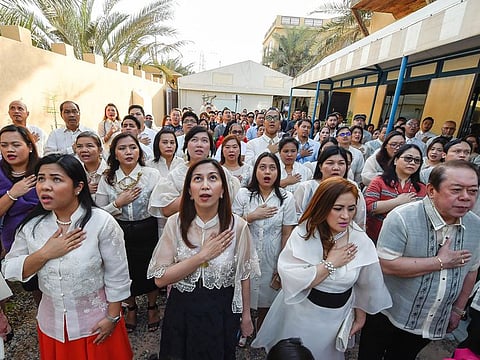OFWs: Agents of change
How influential are overseas Filipinos in bringing about positive change?

Nearly two decades ago, Camp Iranun, then known as Camp Abubakar, was the site of one of the biggest military campaigns against insurgents by the Philippine government. But from a bloody battlefield after decades of seemingly irreconcilable conflicts, the sprawling complex, which straddles portions of several towns and covers an area nearly half the size of Ajman, is now re-emerging as a beacon of hope built around rich agricultural lands and residents’ deeply rooted longing for peace.
Sharon Mendoza-Dreisbach is one of the many citizens who have responded to the call of helping transform Camp Iranun into a more progressive and productive community amid the threat of war and instability in this part of the country. Working with local leaders and the military, Mendoza-Dreisbach organised an agricultural livelihood programme, which she later expanded to include an agro-tourism project. While her efforts directly impact the lives of Iranun Muslims, the cancer survivor and single mother of two actually directs her operations from the UAE, where she is employed as Assistant Professor at Skyline University College at the University City of Sharjah.
“The Almighty Creator gave me another life to live by helping me survive stage 3 breast cancer,” says Dr Mendoza-Dreisbach, a 2018 recipient of the annual Dakilang Bayani (Noble Hero) award the Philippine Consulate in Dubai hands out to overseas Filipino workers (OFWs) in the UAE who have championed advocacies that empower their countrymen. She was diagnosed with the disease in 2015 and is now a leading voice in cancer awareness in the UAE and the Philippines. “I believe that Allah made me survive because I still have a mission to do in this world.”
Dr Mendoza-Dreisbach’s story is a reflection of how OFWs are increasingly becoming catalysts of change in the Philippines despite being physically separated from their home country.
“I have always believed that overseas Filipinos are more than the remittances they send,” says Paul Raymund Cortes, the Philippine Consul-General for Dubai and the northern emirates, noting how OFWs have become a growing force across different fronts of Philippine society.
To be sure, OFWs remain a major contributor to the Philippine economy, with the country being a top beneficiary of remittances. According to the World Bank, the Philippines recorded
$34 billion (Dh124.8 billion) in remittances last year, the fourth-highest in the world.
But Cortes points out how OFWs collectively now have a more influential voice in the affairs of the country. “They have become a strong political force. Because of the perspectives on governance and policy issues that they have witnessed while abroad, the discussions on how we can move forward as far as our political development is concerned have become more expansive,” Cortes explains.
“In addition, they have become champions of spreading awareness on Philippine culture and heritage to the larger global community. They are heroes because they represent the breadth and depth of Philippine history and culture among other global migrants.”
Dr Rex Bacarra, a former Dakilang Bayani award winner, says it’s “tragic, comical even” that OFWs are stereotyped solely based on their remittances. “But I guess the greatest comedies are inspired by the greatest tragedies,” says Dr Bacarra, Dean of General Education at American College of Dubai.
“An OFW hero is not just about the money given, but someone who has a compelling narrative, one who tells a story about overcoming doubts, weaknesses, and fights the loneliness of being away from loved ones.”
Meaningful impact
Dr Bacarra has been a familiar face in various free workshops and talks organised by the consulate and other organisations. “This autumn I will finally realise a lifelong dream of giving free lessons in English, mobile photography and CV making for the public with the help of some friends,” he says. “I am also an advocate of the use of digital technology in teaching. I use apps, digital management system, tablets and gamification of learning, to create better engagement.”
Through initiatives such as the Dakilang Bayani award, Cortes says the Philippine Consulate has been at the forefront of recognising OFWs who have made a meaningful impact in the lives of Filipinos. “I am particularly passionate about how overseas Filipinos can be the conduits of understanding, especially through culture and heritage.”
Dr Nino Decenorio, who has been part of the selection panel of the Dakilang Bayani award, says it’s all about acknowledging people who are making a difference. “A hero is someone who rises from a difficult situation where he unselfishly extends himself for the good of others,” explains Dr Decenorio, Senior Vice-President of Bath Spa University who is himself a recipient of the award for his efforts in helping provide various academic scholarships to Filipino students in the UAE.
Despite the growing influence of OFWs, Dr Decenorio believes much work remains to be done to fully harness the potential of OFWs as a collective political force. “I do not think it is powerful enough to represent a voice in national discussions on policy and governance,” he says. “We have not reached that point yet, but I believe there is a move leaning towards that goal. It [will not happen soon] but it will definitely come.”



